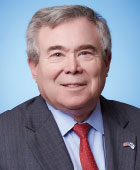What Is It Like to Take Our Message to Capitol Hill?

One of the responsibilities of the APA president and president-elect is to participate in lobbying on Capitol Hill, often with the coalition we call the Group of Six. You may have seen coverage of these visits on APA’s social media and in Psychiatric News. The Group of Six includes APA, the American Academy of Pediatrics, American College of Obstetrics and Gynecology, American College of Physicians, American Academy of Family Physicians, and American Osteopathic Association. Together we represent more than 590,000 physicians and medical students and care for more than 200 million people. Most members of Congress want us to meet with them or their chief aides. They know that the issues we address are important to their constituents.
These visits are highly coordinated by our collective government relations and policy staffs, and much groundwork goes into preparing our lobbying agenda. In each meeting, depending on the issue in which the member of Congress we are visiting is interested, the representative of the medical organization relevant to that issue takes the lead. For my recent visit to Capitol Hill, the top three lobbying issues I addressed were funding for maternal health, prescription drug pricing, and mental health parity enforcement.
I’d like to share a few of my observations from my Hill visits with you. Our organizations have much in common and very few differences. Their presidents are very clinically grounded. We all essentially provide “primary care” to our patients, many of whom have complex needs. What has impressed me again and again is how important mental and substance use disorder issues are to our colleagues. They know that the failure of so many of their patients to access psychiatric care impacts their well-being. I believe that our arguments about the potential harm caused by the sequestration of substance use treatment records was effective in enlisting much support for the proposal to repeal 42 CFR Part 2 regulations (Psychiatric News).
The key to being an effective lobbyist is not about citing statistics or communicating position or policy statements. It’s about telling a story about your patients that illustrates why you are there. Legislators and their aides remember (and use) these stories. On my last Hill visit, I was impressed that my medical brethren had better and more stories than I. A family practitioner from upstate New York who proclaimed himself a gun owner and hunter talked about an elderly male patient with depression who had killed himself with his shotgun. An OB-GYN physician talked about a new mother with opiate addiction and a postpartum patient with severe depression. Dramatic stuff.
Moreover, while I was there to represent APA and psychiatry, I was nonetheless pleased that my colleagues kept “beating me to the punch.” They were making my arguments for me as well as or even better than I might have done. Certainly the congressional staffers were more openly receptive to a pediatrician or family practitioner arguing for enforcement of mental health parity than to someone who might have been perceived as having a self-interest in the issue.
The Group of Six typically meets with members of Congress to thank them for their support or to encourage them to take positions to which we think they will be receptive. My one suggestion to the group on my last visit was to meet with members of Congress who do not support our agenda. We need to try to change their minds by presenting strong arguments for why they should side with us regarding insurance issues, drug pricing, research on firearms violence, suicide, and more. It’s great to thank legislators who are already our friends, but we need to make new ones who will also vote in support of our issues.
I cannot end this column without encouraging you to contribute to APAPAC, APA’s political action committee, and your state political action committees. Like it or not, our political system is fueled by contributions, which get us more direct and informal access to members of Congress and their staffs. Also, I urge you to become involved in lobbying your senators or representative. Not only is it crucial for our patients and the medical profession, but it is also a powerful and eye-opening experience. Advocacy training is readily available through your district branch and at APA meetings. More information on how to get involved is posted on APA’s Advocacy Center. ■



